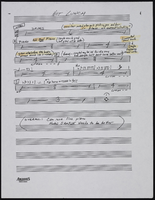Search the Special Collections and Archives Portal
Search Results

Transcript of interview with George Cichoski by Tracey Bradley, March 15, 1981
Date
1981-03-15
Archival Collection
Description
On March 15, 1981, Tracey Bradley interviewed George Cichoski (born 1939 in New Kensington, PA) about the roles and functions of the Cumorah Credit Union, which served members of the Mormon Church. Cichoski first talks about the development of the credit union, the effects of the change from federal to state charters and those advantages, and the overall function of a credit union in general. Cichoski also discusses the Financial Institutions Act and its effects on credit unions, the innovative services that credit unions would need to adopt to retain their members, and what he believes will be in store for the future of credit unions.
Text

Transcript of interview with Suzette Cox by Andrew Lazarus, March 15, 1981
Date
1981-03-15
Archival Collection
Description
On March 15, 1981, Andrew Lazarus interviewed Suzette Cox (b. 1945 in San Diego, California) about her experiences of living in Las Vegas, Nevada. Cox talks briefly about her move from California to Las Vegas, her employment at two police agencies and a local newspaper company, and her family. The two also discuss racial discrimination issues in Las Vegas and Cox’s experiences in sports as she was going to school in Las Vegas. Cox later describes how the Strip influenced her life and move to the city, the crime rate in Las Vegas and Nevada and how it related to tourism, and her recollection of the effects of the above-ground atomic testing.
Text

Transcript of interview with John E. Craddock by Melody Craddock, April 10, 1977
Date
1977-04-10
Archival Collection
Description
On April 10, 1977, Melody Craddock interviewed her father, Dr. John E. Craddock (b. 1922 in San Diego, California), at their home about his experiences while living in Las Vegas, Nevada. Also present during the interview is Nancy Craddock, Melody’s mother, and George Apfel, Melody’s boyfriend. John, who was a dentist in the Navy, describes how Las Vegas was when he first arrived to the city in 1952. The three also discuss the development of the nearby Twin Lakes and Lorenzi Park, John’s personal experiences in witnessing the effects of the atomic testing, and the family’s experiences during trips to the nearby mines. John also talks about hunting in different parts of the state and finalizes the interview by describing the development of the different local airports.
Text

Transcript of interview with Patricia Carmichael Craddock by Joe Schneider, March 2, 1980
Date
1980-03-02
Archival Collection
Description
On March 2, 1980, Joe Schneider interviewed Patricia “Pat” Craddock (born 1928 in Las Vegas, Nevada) in her home about her experiences in Las Vegas, Nevada. Pat first talks about growing up in Las Vegas, where she became a teacher, and her eventual travels to live in other cities across the United States. The two discuss Craddock’s experiences as a teacher, the educational system in Nevada, and the specific individuals with whom she worked in education. Craddock also talks about the changes of Las Vegas in general, the perception of Las Vegas from people in other parts of the country, and what she believes the future of the school system will bring. Pat later mentions Helldorado, and she mentions the types of recreational activities available to young people during her time. The interview concludes with Pat’s recollection of her most memorable student while she was a teacher.
Text

Transcript of interview with Norman Forsythe by Bill Cunningham, March 4, 1978
Date
1978-03-04
Archival Collection
Description
On March 4, 1978, Bill Cunningham interviewed Norman Forsythe (born 1927 in St. Paris, Ohio) about his experience as a firefighter in Las Vegas, Nevada. Forsythe discusses his original move to Las Vegas and his eventual joining of both the city of Las Vegas and Clark County Fire Departments. He also goes into detail about fighting the fire at the El Rancho Vegas in 1960. Forsythe also talks about the responsibilities as his then-current rank of battalion chief. The two also discuss housing in Las Vegas, the living conditions of the city, and Forsythe’s family. The interview concludes with Forsythe talking briefly about his family’s recreational activities and his experience as a baseball coach.
Text

Transcript of interview with Chet Carrigan by Robert Kahre, February 17, 1981
Date
1981-02-17
Archival Collection
Description
On February 17, 1981, Robert Kahre interviewed Chet Carrigan (born 1912 in Texas) about his experience living in Las Vegas, Nevada. Carrigan first talks about his background in construction as well as some of his experiences in the Sheriff’s Posse before describing the major events and changes of Las Vegas that he witnessed. Carrigan also talks about his family, the effects of the Great Depression on the city, the flooding problem, and the building of Hoover Dam. He also describes the first schools in Las Vegas, means of transportation, his laundry business, and his experience on the volunteer fire department. The end of the interview involves a discussion of topics including the first movie theaters, Cashman Field, underground water, the railroads, and Carrigan’s thoughts on the future of Las Vegas.
Text

Transcript of interview with Helen M. Clark by Danny Winegar, March 5, 1979
Date
1979-03-05
Archival Collection
Description
On March 5, 1979, Danny Winegar interviewed Helen M. Clark (born 1921 in Memphis, Tennessee) about her experiences in Nevada. Clark first describes why she and her family moved to Las Vegas and then explains why she was homeschooled. She then talks about her secretarial work for a prominent real estate agent in Las Vegas and some of her work in that field. Clark also discusses the beginning of tract home building, gambling, and the building of Hoover Dam. She also mentions life during the Great Depression, prostitution in Block 16, and the Helldorado celebration. The interview concludes with Clark’s recollection of the first hotels and casinos that were built on the Strip, including those who built them and the mob influence over them, and a brief mentioning of her experience as a real estate agent.
Text

Transcript of interview with Nancy Craddock by George Apfel, March 13, 1976
Date
1976-03-13
Archival Collection
Description
On March 13, 1976, George Apfel interviewed Nancy Craddock (born 1922 in Anaheim, California) at her home about her experiences of living in Las Vegas, Nevada. Craddock begins by discussing her move from San Diego to Nellis Air Force Base with her husband in the 1950s and their eventual move to the Twin Lakes area, at which they had their home built. She provides details about living in this area, such as the recreational activities of her children and the neighbors who lived on the same street, one of whom was a mayor of Las Vegas, Oran K. Gragson. Craddock, a medical laboratory technician, also talks briefly about her experiences while working at Sunrise Hospital, and she later describes how properties operated on the Las Vegas Strip in its early days. The interview concludes with Craddock’s knowledge on the early pioneers of Las Vegas, the formation of the university’s library, and the social conditions during the 1950s compared to those at the time of the interview.
Text

Transcript of interview with Robert Foster by Kelley Tuchman, March 2, 1978
Date
1978-03-02
Archival Collection
Description
On March 2, 1978, Kelley Tuchman interviewed Dr. Robert Foster (born 1921 in Colorado Springs, Colorado), principal of Helen J. Stewart School, about his experiences in educating and helping the mentally disabled. Foster first talks about his background in the military and his eventual teaching experience in special education at the University of Nevada, Las Vegas. Foster then discusses his motivations for getting into the special education field and later talks about the growth of the program in Clark County and throughout the country. He also describes the role of legislation in helping the mentally disabled and later goes into detail about the approaches of the training and education program itself. Toward the end of the interview, Foster mentions a few of his personal experiences and discusses the importance of volunteering to help the mentally and physically disabled.
Text
Pagination
Refine my results
Content Type
Creator or Contributor
Subject
Archival Collection
Digital Project
Resource Type
Material Type
Place
Language
Records Classification

